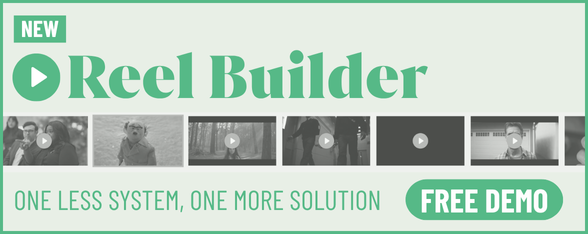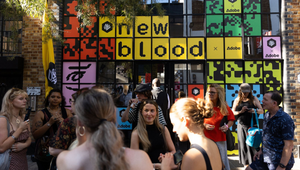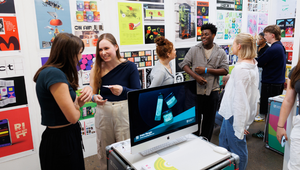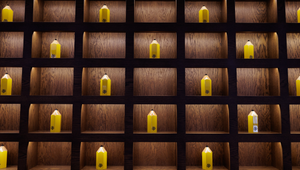
Oatly Goes Big - But in a Punk Way

Oatly has recently been on a true creative tear. From creating the ‘Fuck Oatly’ website, which compiled all the conflicting views on the brand and opened a conversation directly with its representatives, to daring dairy farmers to publish their climate footprint, the oat milk giant has really been on it. While doing that, it has established itself as the rebel of vegan brands, both scientifically and from a marketing perspective, positioning itself as the safe haven for creatives and their freedom of expression.
At this year’s D&AD Festival, the two days of talks closed off with a conversation between Michael Lee, creative director at Oatly and Charlotte Williams, co-founder of The Thought Partnership, about the brand's ascent and presence. “I think Oatly’s positioning as a rebel has more to do with the way we’re set up,” said Michael. “We have the fortunate situation where there is a massive amount of trust and mandate in the creative department (known as the department of mind control), which is quite rare and completely depends on the trust that our CEO has in our global chief creative officer (John Schoolcraft) and in our creatives to do what they do best, so he can get the fuck out of the way. Because we work differently, the work feels different.”
This is the case with the ‘Fuck Oatly’ experiment, which began as quite the creative leap and was met with a good amount of scepticism within the organisation. ‘Fuck Oatly’ became a website dedicated to the brand’s mishaps in marketing. “We get a lot of hate and a lot of people don’t like what we do, so we put it on a website to document it all,” explained Michael. On the surface, ‘Fuck Oatly’ naturally felt so wrong to do, so for Michael, it had to be somewhat right. It not only further cemented transparency as one of the brand pillars of Oatly, but it also became the clearest interpretation of how that transparency runs through the brand’s DNA. As the website grew, it eventually became a forum for discussion. “People read it and if they still hate us then fine, it’s a free country. We embrace the hate. In some ways, if we do a campaign and are not getting any negativity or provoked responses, then we’re doing something wrong. I put it this way - the first people over the trench always get shot, but somebody has to pave the way for a lot of these issues to seep into society. We get shot a lot, but it comes with the territory.”
The internal trust within Oatly is not only reflected in the freedom of the work, but also in the fact that, as Charlotte put it, it has ascended the idea of a brand and has become more of a ‘tone of voice’. For Michael, that voice is essentially the voice of John Schoolcraft - “He is laid back. He cares, but he doesn’t care. We always try to be human about everything. A lot of times in marketing and advertising you’re trying to shift your voice to accommodate targets - we don’t do that. We are ourselves always, regardless of if we’re talking to millennials or business leaders. There’s always this one person at a party who walks in and they’re so interesting and intriguing, but you can’t quite put your finger on why… That’s who we are.”
This goes not only for generation-based targets, but also for vegans and non-vegans - both of which Oatly treats the same. This is rare in the plant-based business, where we see a lot of brands aiming to shift opinion, albeit with a good purpose, but sometimes without a good strategy. Michael explains that Oatly knows nobody wants to be preached at or told what to do, so they’re all about making plant-based easy and provoking those small steps in society. “One day we’ll do a campaign where we’ll be challenging the food industry to put their climate labels on their products, and the next day we’re gonna do complete nonsense, just because we think it’s funny. What makes that work is that sense of depth to our work and mission. A lot of times people see something funny we did on TikTok, or a headline that is interesting, then they’ll go on the website, get to know the company and slowly see the layers beneath that stuff - this is when they get on our side.”
Becoming that tone of voice and the cool person at the party comes with its risks however, and while on the outside Oatly looks like the perfect place for a creative to work at, Michael explained that things always come back to trust and responsibility. “The culture we have created has to do with the complete trust from senior management in letting us do whatever we want. But with great power comes great responsibility. We’re allowed to take all these risks, but if things fuck up, that’s on us and we have to answer for that. A lot of people see our work and they feel it’s a bit flippant or nonsensical, but actually it’s been thought through extremely carefully.”
He continued, “Coming from an agency where you’re only working on a brief, a small tiny piece of a problem, there is a huge difference. Here you have all the bells and whistles of a company. It’s rare that creatives have access to those things in most companies, but here we actually do. We’re involved in sustainability, innovation, PR, all of it. This creates a whole new depth of thinking that you’re allowed to have as a creative.”
It is quite telling that the first day when Michael got his job at Oatly he wasn’t met with having to solve problems related to selling a product or marketing a particular yoghurt. It was: “What are we going to do in the UK?” To which he said “I have no fucking idea.” But this just goes to show the scope of work and the level at which creatives enter a challenge at Oatly.
The rebel attitude and the ‘mind control’ department didn’t always look like that though. Oatly has been around for 23 years and started off as a little upstart from the south of Sweden, which has now gone beyond a challenger and into the big leagues. “Oatly was started in 1993 by university students. The real shift was felt when Toni Petersson came, who used to be the CEO, and I actually think there was some foresight,” said Michael. “The company was run by engineers and scientists before Toni and when he came in and the board wanted someone who had no FMCG experience, which was bold and interesting of them. When Toni came, the first thing he did was to speak to his friend John Schoolcraft and ask him to join, to which he said ‘No fucking way, I’m not working on oat milk’. But eventually he came around it, only if Toni promised to fire the marketing team.”
They did exactly that. And the brand embarked on the strategic journey to transition itself from a scientific company to the lifestyle brand we know it as today. “The packaging you see today, when presented to the entire company at its conception, had people in tears - engineers and scientists alike - because they thought we’re taking the piss out of their work and this will destroy Oatly. Toni said ‘Thanks for the input. But we’re doing it anyway’.” This rapid change happened almost overnight. In fact, it happened so quickly, that they started receiving calls from concerned customers letting them know that another brand is using the name ‘Oatly’ in the supermarkets.
So, with a few brave leaps and internal commotions, Oatly started growing into the company it is today. And while there are internal conversations about how to keep the challenger mindset while growing rapidly, Michael believes it’s a good problem to have - “We can lean on it. Now we have a bigger megaphone to talk through. The challenge now is to do fucked-up stuff on a large scale.” The mindset of the large scale also translates to Oatly’s affinity towards OOH advertising - something they have never been strangers to. A billboard, Michael said, at the end of the day, is the best way to immerse audiences in your message. “The way we approach the OOH media, especially in London, which is a great city for it, is that we go down to the street and neighbourhood level and we buy everything, even though it might not make sense. What we want is people to be surrounded by this propaganda - let’s be real, we’re pushing propaganda here.”
So, what’s next? Michael knows that the future for Oatly holds the same challenges as it does for a lot of other challenger brands - how do you keep your edge as you grow larger and investors come in, as you become listed as a public company, as more regulations come in? “Our challenge now is to figure out how to go big, but in a really punk way.”















